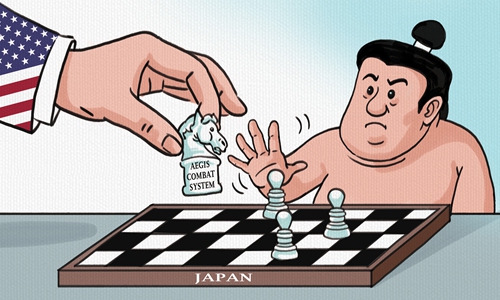Japan unlikely to abandon Aegis Ashore system
By Da Zhigang Source:Global Times Published: 2020/6/18 16:43:40

Illustration: Liu Rui/GT
Japanese Defense Minister Taro Kono on Monday suspended the deployment of the US-developed Aegis Ashore missile defense system. On Tuesday, he issued apologies for "troubling the local people" of Akita and Yamaguchi prefectures, where the deployment sites were going to be.
The suspension has sparked controversy in Japan. The government is faced with criticism. Opposition parties in Japan said the ruling party and defense departments should be held accountable for these expensive items that Japan doesn't need, yet was pressed by the US to buy.
Why did Kono abruptly announce the suspension of the deployment plan that was seen by Japan as important defense project and started in December 2017? The reasons lie in the cost and time needed for the deployment, the erroneous geographical survey that selected candidate sites, and the reflection of the 2017 deployment plan that was "correct at the time" but now "cannot be deemed rational."
The current software and hardware of the Aegis Ashore system cannot operate as the Japanese Defense Ministry assured - booster rockets carrying interceptors would not fall within nearby residential neighborhoods. To avoid the potential risk, it could require more than $1.8 billion in modifications of the system, according to Nikkei Asian Review. The estimated total cost of which is roughly $4.2 billion.
The erroneous choice of deployment locations has also sparked local anger and opposition. In August 2018, Defense Ministry officials visited Akita to explain their plans, but the explanation was not accepted by local residents or politicians. This sparked backlash as people found that booster rockets carrying interceptors would fall within nearby residential neighborhoods.
With negotiations with local authorities at both sites going nowhere, the government has not budgeted for land development and building construction for the batteries out of fears of a further backlash, Nikkei Asian Review reported on Thursday. Such being the case, revising the plan might be a better option for the Japanese government.
The Aegis Ashore system was meant to help Japan counter missile advances by North Korea, but now the tension with Pyongyang has been reduced. Moreover, given the raging COVID-19 pandemic and Japan's expectations in the post-pandemic era, it is not a good choice for Tokyo to provoke China and Russia with such an anti-missile defense system. This could trigger an arms race in the region. Kono admitted that, "Our understanding of the matter was naïve."
Anyway, the suspension of Aegis Ashore deployment will influence not only Japan's security policy, defense system, and capability of dealing with emergencies, but also the Japan-US relationship, and even security patterns in Northeast Asia.
The suspension will harm the reputation of Japan's defense policy, weaken the Abe administration's ability to communicate with local governors in terms of defense issues, and probably leave a loophole in Japan's defense system policies.
From the perspective of Japan-US military cooperation, the suspension could affect the quality of this cooperation, Japan's purchase of US weaponry, the share of the cost of holding US military bases, and the following possible cooperation on missile defense systems. However, on the other hand, the Japanese decision is favorable to Northeast Asian security situation. It cools down a possible regional arms race.
But obviously Japan won't give up the costly system bought from the US, nor the construction of a missile defense system. The current suspension won't necessarily be permanent. Now that people are opposing the plan, Kono certainly wants to keep his nose clean. But when an opportune time arises, the Japanese government will make adequate preparations and probably restart the deployment.
After all, Japan cannot really quit the circle of friends that relies on the US-led cooperative theater missile defense. Neither Kono nor Japanese Prime Minister Shinzo Abe, nor Abe's successors can manage that.
The author is director and research fellow of the Institute of Northeast Asian Studies at Heilongjiang Provincial Academy of Social Sciences and chief expert at the Northeast Asian Strategic Studies Institute. opinion@globaltimes.com.cn
Posted in: VIEWPOINT,OTHER REGIONS